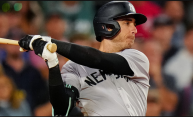The Suns were proactive in the trade market, adding Charlotte Hornets center Nick Richards and the Denver Nuggets' 2025 second-round pick. Some rumors suggest Jusuf Nurkic will also be on the trade block.
In return, the Suns exchanged Josh Okogie and three second-rounders, including two from the Nuggets in 2026 and 2031, plus a Suns original in 2031, to Charlotte. It is not a blockbuster trade, but this deal solves the immediate center problem for Phoenix and creates a relatively inexpensive option for the franchise to strengthen its roster.
Phoenix Suns Trade Grade: A+
The Suns' trading for Nick Richards is an interesting decision, considering they are still searching for bigger names, such as Jimmy Butler. As CBS Sports says, the deal might not be earth-shattering, but it does clear up a pretty evident need in the Suns' lineup. The team has been looking for a center who can provide solid defense and rebounding.
They see potential in Richards. The 25-year-old center offers athleticism, mobility, and the ability to protect the rim—qualities that Phoenix has lacked at times this season.
The Suns' front office hopes Richards can replicate the success of other players who have thrived after leaving struggling teams. The Dallas Mavericks acquired Daniel Gafford, who proved to be an essential asset in their run through the playoffs.
Like Richards, he showed flashes of his ability, but Charlotte still didn't properly utilize them, as the team was in chaos most of his time there. The Suns are convinced that the right coach with the right system can bring the best out of Richards.
Read more: NBA Trade Rumors: Lakers Might Find Another Defensive Wing to Pair With Dorian Finney-Smith
Why This Deal Makes Sense for the Suns
Richards arrives at the Phoenix Suns on a cheap contract, with a non-guaranteed $5 million salary for the following season. That kind of financial flexibility is important for a team that is managing its assets carefully. The move saves the Suns about $20 million in luxury taxes and preserves their 2031 first-round pick, which could be critical in future trades, including a potential move for Jimmy Butler.
However, it's worth noting that Richards may not be a sure thing to succeed. With everything he has, he is still a largely unknown factor.
Pairing him with elite teammates like Devin Booker and Kevin Durant will hopefully allow him to become enough of a commodity off the pick-and-roll. Phoenix's success in getting him involved offensively will be based on their ability to change their system to take full advantage of his strengths.
Charlotte Hornets Trade Grade: C
From the Hornets' perspective, trading Richards makes sense. With the emergence of rookie Moussa Diabate and Mark Williams's return to health, Charlotte's center rotation was getting crowded. Diabate, in particular, has impressed defensively, allowing the Hornets to shift their focus toward developing him further.
Of course, the Hornets have invested in Diabate as a defensive staple for the future. However, the trade value they received back—two second-round picks—is somewhat suspect.
Did Charlotte miss out on a better opportunity by trading Richards before the deadline? Possibly, but Richards's non-guaranteed contract for next season meant that his playing time would be at risk if he weren't playing as much, potentially reducing his trade value.
© Copyright 2026 Sports World News, All rights reserved. Do not reproduce without permission.











